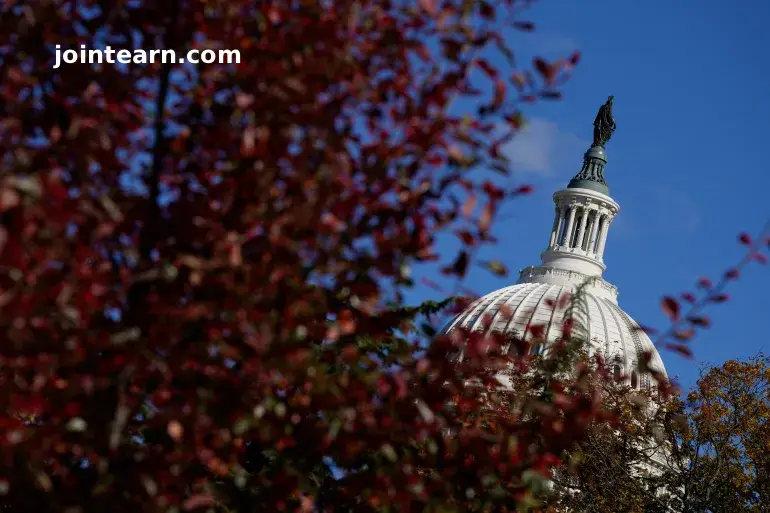
Senate Approves Bipartisan Deal to End Historic Shutdown
Washington, D.C. — After more than five weeks of federal gridlock, the United States Senate has passed a long-awaited spending bill to reopen the government, marking a crucial step toward ending the longest shutdown in US history.
The Senate voted 60–40 late Monday to approve a temporary funding package that will keep the government running through January 30, 2026, while restoring back pay to hundreds of thousands of federal workers furloughed or working without pay since the shutdown began on October 1.
The legislation must still clear the House of Representatives before heading to President Donald Trump, who has not yet said whether he will sign the bill.
House Moves Quickly Toward Final Passage
House Speaker Mike Johnson called on members of Congress to return to Washington immediately, saying he wants to “move this forward by Wednesday.”
“The American people have waited long enough. We need to reopen the government and get back to work,” Johnson said.
The move comes after a weekend of intense bipartisan negotiations, during which seven Democrats and one Independent joined Republicans to advance the measure for a vote.
The deal provides three-year funding for the Department of Agriculture, Food and Drug Administration (FDA), military construction projects, veterans affairs, and congressional operations — offering relief to millions affected by the impasse.
Healthcare Subsidy Fight Delayed
The compromise, however, does not resolve one of the central disputes behind the shutdown: the extension of healthcare subsidies under the Affordable Care Act (ACA), commonly known as Obamacare.
Instead, Senate Republicans agreed only to hold a separate vote by December on whether to continue those subsidies, which currently support around 24 million Americans.
Analysts warn this could set the stage for another government shutdown in early 2026 if lawmakers fail to reach a longer-term deal.
“This is a stopgap agreement, not a permanent solution,” said David Smith, Associate Professor at the University of Sydney’s United States Studies Centre.
“If Congress doesn’t resolve the Obamacare subsidies by the end of January, we could see the government shut down again.”
Democrats Divided Over Compromise
The bipartisan move has sparked sharp divisions within the Democratic Party.
The eight lawmakers who joined Republicans — Dick Durbin (IL), Angus King (ME), John Fetterman (PA), Catherine Cortez Masto (NV), Jacky Rosen (NV), Maggie Hassan (NH), Jeanne Shaheen (NH), and Tim Kaine (VA) — argued that they prioritized “country over party.”
“We had to end the chaos,” Fetterman said on NBC’s Meet the Press.
“Millions of Americans were missing paychecks, food programs were collapsing, and airports were understaffed. It was time to act.”
However, progressive leaders and party strategists have condemned the deal, calling it a “premature surrender” to Republican pressure.
Illinois Governor JB Pritzker, a potential 2028 presidential contender, dismissed the bill as an “empty promise.”
“Democrats just handed the GOP leverage without getting healthcare guarantees in return,” Pritzker said.
Federal Workers, Airports, and Services Affected
The shutdown, which began on October 1, had paralyzed federal operations and caused major disruptions nationwide:
- Hundreds of thousands of government employees were furloughed or working without pay.
- Air travel delays worsened after the FAA announced a 10% reduction in air traffic due to staff shortages.
- Food assistance programs and veterans’ services faced funding lapses, heightening public frustration.
President Donald Trump had previously suggested using the shutdown as an opportunity to “trim the bloated federal workforce,” a comment that drew heavy criticism from both parties.
Bernie Sanders Slams Bill as “Cruel and Dysfunctional”
On the Senate floor, Senator Bernie Sanders (I-VT) blasted the temporary deal, saying it worsens the nation’s healthcare crisis by failing to secure ACA subsidies.
“Everyone knows our healthcare system is broken,” Sanders said.
“Instead of fixing it, this Senate is about to make a horrific situation worse. Millions could lose coverage while costs skyrocket.”
According to estimates from the Kaiser Family Foundation, ending the ACA subsidies could cause premiums to double for 20 million Americans by 2026, while an additional 15 million could lose insurance altogether by 2034.
What Happens Next
The House of Representatives is expected to take up the bill within days. If passed, it will go to President Trump for final approval — a decision that will determine whether federal agencies reopen this week or remain shuttered into the holidays.
Economists warn that every additional week of shutdown costs the US economy an estimated $6 billion in lost productivity and consumer spending.
“This deal provides temporary relief, but it’s not the end,” said policy analyst Jennifer Morales of the Brookings Institution.
“Until Washington reaches consensus on healthcare and budget priorities, Americans will continue living under the shadow of another potential shutdown.”
Key Takeaways
- Senate passes bipartisan funding bill to end the longest-ever US government shutdown.
- Bill funds federal operations through January 30, 2026.
- House vote and Trump’s signature still required.
- Healthcare subsidies remain unresolved — new vote expected by December.
- Progressive Democrats criticize deal as “empty promise.”
- Bernie Sanders warns millions could lose healthcare coverage.


Leave a Reply